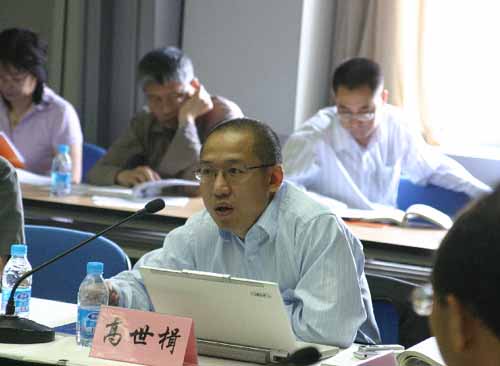By Sapna Maheshwari & Yan Pei
The growth of inequality and poverty in China is a direct result of globalization, said visiting professor and author Raphael Kaplinsky to a group of Chinese development experts on Friday.

Raphael Kaplinsky. Photo by Peng Yaolin.
Kaplinsky, a professor of development policy and practice at Open University in the United Kingdom, spoke for an hour about globalization and sustainable development in China at a seminar sponsored by the State Intellectual Property Office (SIPO), Intellectual Property Publishing House and Yunnan University of Finance and Economics.
Experts in attendance included SIPO Deputy Chief Yang Tiejun, the director for the Institute of Population, Economist at the Chinese Academy of Social Sciences (CASS), Zuo Dapei, and professors from Peking University, Yunnan University and the Chinese Academy of Sciences (CAS).
China's manufacturing and exports are growing at such a rate that it is hurting other developing nations, Kaplinsky said.
"The rest of the developing world finds it impossible to compete with China," he said, using the clothing industry decline in Africa as an example.
He added that China has a responsibility to other nations to consider their economies when creating their policies.
"China's impact on the world and the world's impact on China are disproportionately large," he said.
"When 40 percent of the world is growing at 10 to 11 percent a year, it is disturbing the world in a way never seen before," he said, grouping China and India together.

Cao Heping. Photo by Peng Yaolin.
He discussed the political implications of globalization as well as various economic models that supported his points.
Gao Shiji, a department director at the Development Research Center of the State Council (DRC) agreed that globalization has resulted in growing inequality within and between countries.
Globalization has a lot of benefits on the world economy, such as enlarging market scales and promoting the performance of resource allocation, he said. The difficulty lies in distributing these benefits among countries or among different groups in a single country.
"With unjust international trade rules and unreasonable domestic policies, inequality can be worsened and the interest of certain countries and groups will be undermined," Gao said.
Gao disagreed with Kaplinsky's view that China is a winner in the process of globalization and his contention that its rapid development in manufacturing and export has deprived other developing countries of advancement opportunities.
"Regional inequality is a serious problem in China and we still have a few cities that are in extreme poverty...those cities should be taken into special consideration," Gao said, arguing that average economic numbers cannot show the whole picture.
Cao Heping, vice dean of the School of Economics in Peking University, agreed with Gao.
"China is not an absolute winner in this process," he noted. "China's share in products did increase during the past decade, but [it] didn't increase as much in the share of real value."
Cao said that in 2007, China produced at least 35 percent of the world's total products, but its GDP represents only 6 percent of the overall world GDP.
"At some level, China is still a loser and we are still at the lower end of the value chain." Cao said. "The real winners are the countries that stand at the upper end of the value chain, like the U.S. and Europe."
He added that globalization is a political issue rather than just an economic one.
"The imbalanced distribution of world value and the absence of secondary distribution have led to a vicious circle," Cao said.
At the end of the meeting, Gao summed up the two hours of debate and discussion.

Gao Shiji. Photo by Peng Yaolin.
"Thirty years ago, China started her self-improvement with the acceptance of an unjust international trade system," he said. " Yet through the efforts of the whole nation and the precious tools of reform and opening up, China has achieved outstanding development. In the future, we will still firmly stand by other fellow developing countries and work together for a fairer international trade system."
Except for Kaplinsky's lecture, the entire conference was conducted in Chinese.
However, Kaplinsky did not mind.
"It's a very good thing," he said. "I'm just an artifact for a discussion in China that needs to be held."
"I regret that I can't understand what people are saying... because I am not blaming China," he said.
(China.org.cn June 6, 2008)